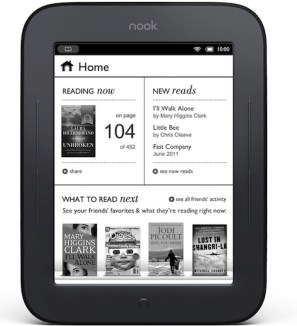Why E-Readers haven’t replaced books

The first edition of the NOOK E-reader. Barnes & Noble.
Books can be accredited as the backbone of society. From religious texts like the Bible and Quran, to those that spark societal movements such as “Uncle Tom’s Cabin” and “Common Sense.” Books and novels shape humanity and our perspective on humanity.
However, one argument that comes to question is that with the consistent evolution of technology, why haven’t novels and books alike been outdated like resources including giant phone books and businesses like blockbuster?
Journalist Peter Costanzo states to those arguing over the debacle,
“We often compare publishing to the music industry, and yes, record companies have been dealing with fast moving changes of their own over the years, but regardless of the medium, if you and I are standing in line at Starbucks and I ask if you’ve heard Beck’s new album and liked this song or that, you will know what I’m talking about because regardless of how you ultimately heard the tracks, whether by CD, vinyl, or download, we both heard the songs the way the artist intended.”
There is a reason readers are notorious for making the statement, “the book is always better than the movie.” Reading, for those who do so for pleasure, is an experience. An experience in which an online application has failed to give many. If you listen to a new album, it is the same album. But if you watch a movie, the experience is much different in a theater than on an iPad. How a reader enjoys a novel is heavily based on their environment.
Maureen Debacle of The Federalist confessed,
“An e-book is wonderfully efficient—but it is a utilitarian, prosaic efficiency that comes at a price. The monotony of scrolling works against our attention span. Reading for the delight of it—however sober the topic—is a kind of play. To be lost in a book is a festivity pursued for its own sake. It never has to stop for an upgrade or a battery charge. The book on paper, the untrendy p-book, never blows up or has to be recalled like a Galaxy 7. Spill coffee on it, and it still works.”
Physical books evoke memories and tie us to past and future generations. A librarian does not flip through their annotations or rome their personal library with a burst of nostalgia on a tablet.
Emily, a WRHS Sophomore, admits, “I’ll never switch to an e-reader. I don’t get the same feel from an E-reader.”
It may be simply the love of an experience that has enraptured the print market; however, it is 2017 and E-readers debuted in 2012, a five year difference, and sales have not skyrocketed.
Simply said, paper pages are not going away anytime soon.
Your donation will support the student journalists of Wiregrass Ranch High School. Your contribution will allow us to purchase equipment and cover our annual website hosting costs.

I'm currently a sophomore at Wiregrass Ranch High School and when I am collecting new ideas for my next article I can be found in a variety of places...

Freiser • Mar 27, 2017 at 8:05 am
LOVE THIS!!!! Well done!!!